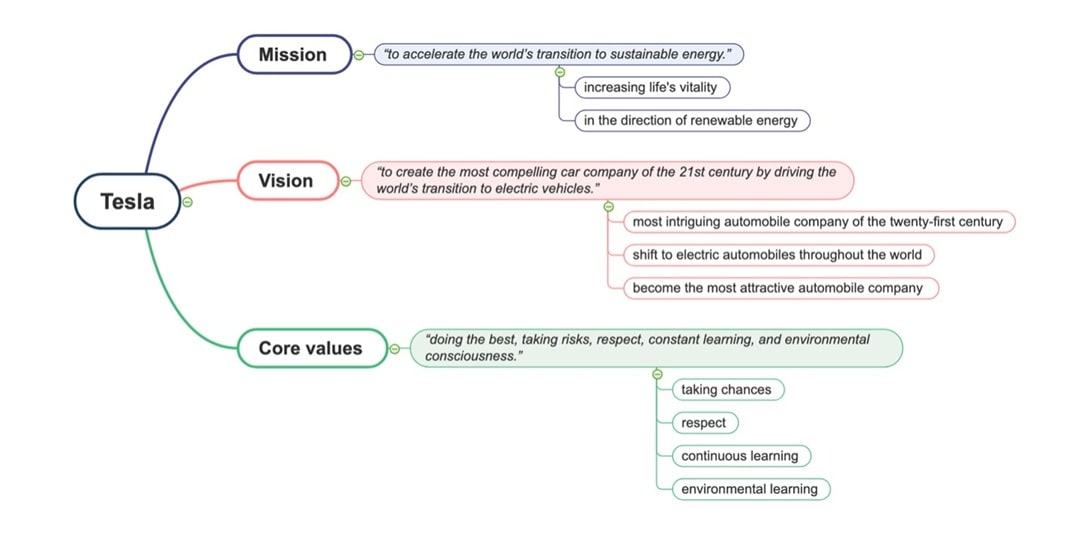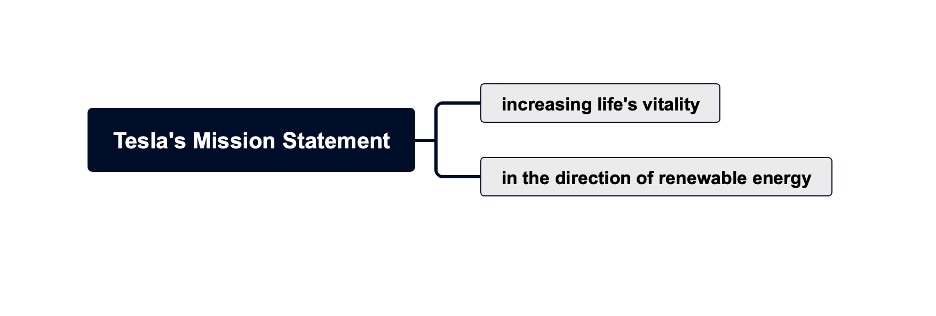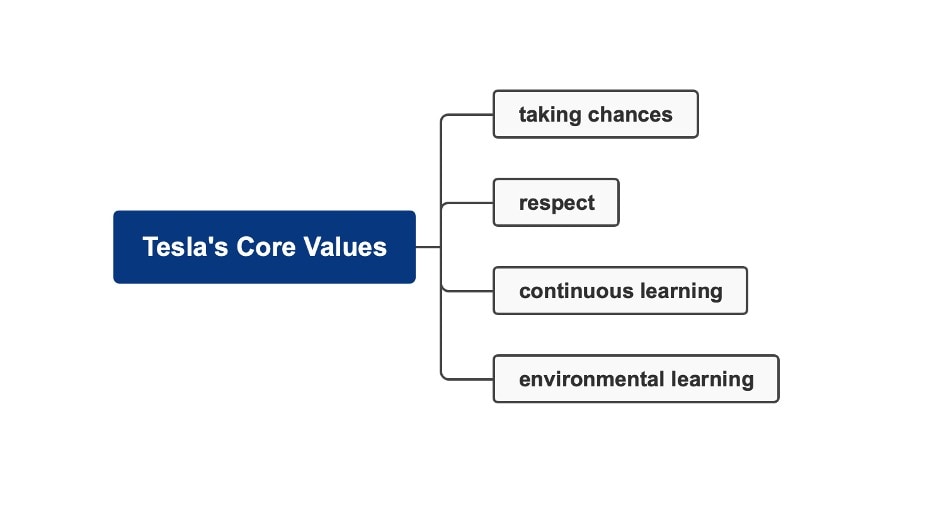The corporate mission statement, in essence, directs Tesla's strategic decisions, such as what the firm must undertake to achieve business effectiveness.
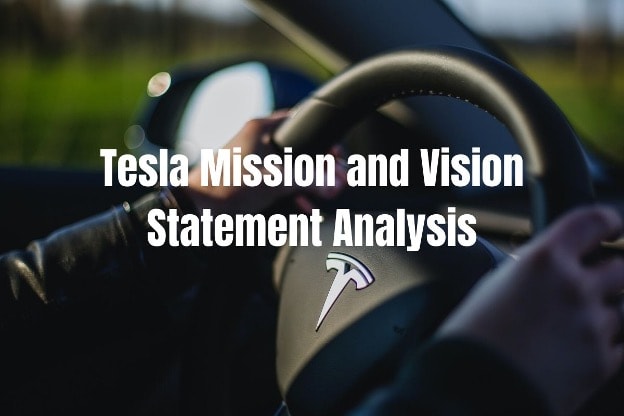
In this article
Overview of Tesla
The nature of Tesla, Inc.'s notable all-electric automotive manufacturing and associated industries is reflected in its goal and vision statements. The firm, which was founded in 2003, became profitable in 2013.
The market is reacting to the company's automotive and energy storage solutions, as seen by its continued expansion. This article will explore Tesla’s mission-vision statement, which guided its continuous growth.
But before that, you can see the renowned company's current status. Here are some key details about Tesla as a company:
| Aspect | Information |
| Founded | 2003 |
| Headquarters | Palo Alto, California, USA |
| CEO | Elon Musk |
| Annual Revenue (2025) | $92.72 Billion USD |
| Market Cap | $1.034 trillion USD |
| Key Products | Electric Vehicles, Solar Panels, Energy Storage Solutions |
| Latest Growth | 7% profit growth in Q1 2025 |
| Official Website | www.tesla.com |
Tesla’s Mission Statement
“To speed the world's transition to sustainable transportation” is Tesla’s mission statement. However, under Elon Musk's leadership, the business's objective was altered to "accelerate the expansion of sustainable and renewable energy" in mid-2016.
This new statement has a minor but essential adjustment in the company's business strategy. The new corporate goal acknowledges the value of the company's batteries and related energy storage technologies in industries other than electric cars.
To Speed Up the World’s Transformation
Tesla's position in driving the industry forward to innovative technologies for sustainable business and goods that rely on renewable energy is established by the "to advance" component of the company’s mission statement.
The company's business objective also cites "the world's transformation," implying that it expects to dominate the worldwide demand for electric vehicles and related items. This element is linked to the business vision statement's emphasis on the global market.
In the Direction of Renewable Energy
Furthermore, the shift from "sustainable transportation" to "sustainable energy" demonstrates how Tesla, Inc.'s corporate mission statement changes to reflect the company's current strategic goals.
Tesla’s Vision Statement
"To become the most attractive automobile company of the twenty-first century by spearheading the world's shift to electric vehicles" is Tesla’s vision statement. The business's emphasis on renewable energy is emphasized in its business goal.
The organization explicitly tackles the electric vehicle sector as a primary channel for aiding worldwide renewable energy market growth. In Tesla Inc.'s vision statement, the following elements are important:
The Most Intriguing Automobile Company of the 21st Century
According to its corporate vision statement, Tesla, Inc. aspires to be a compelling company in the business. This component denotes corporate leadership and excellence. This goal is achieved by incorporating innovative technology into the company's electric vehicles and related goods.
On the other hand, the "car company" element of the business strategy focuses Tesla Inc.'s efforts on developing and producing automobiles.
The "21st-century" component is satisfied by the company's management in electric vehicle development and manufacturing. This element denotes the company's utilization of cutting-edge technologies to address contemporary issues such as environmental conservation.
Spearheading the World’s Shift to Electric Vehicles
This component refers to the company's long-term objectives. The company, for example, is continuing to expand its operations, with plans for additional plants in Asia's emerging regions.
Considering the competitive environment today, such expansion addresses significant competitors. The company's vision statement displays the organization's goal to make EVs the standard in the automobile market.
Tesla’s Core Values
"Doing the best, taking chances, respect, continuous learning, and environmental responsibility" are Tesla's fundamental principles. Tesla uses these core values as the guiding principles for all partners' and employees' general behavioral patterns.
The firm also pushes its staff to take measured risks while driving breakthroughs. This type of atmosphere promotes everyone's overall learning, which results in outcomes that are in line with Tesla's environmental protection standards.
Furthermore, Tesla's achievement is largely due to the corporation's promotion of respect among the many players who have come into contact with the organization.
How To Make a Tesla Mission Vision Statement Analysis Mind Map
Mission and vision statements are easier to study when placed visually. Instead of reading long text, a mind map breaks it into smaller, connected ideas.
For Tesla, this approach helps show how the mission focuses on accelerating the transition to sustainable energy, while the vision highlights shaping the future with innovation.
You can see these points in a diagram to understand Tesla’s present goals and long-term direction.
Use a Professional Mind Map Maker
Creating a mind map does not require advanced design skills. With Wondershare EdrawMind, you can quickly build a professional Tesla analysis. The software has ready-made templates that only require you to add Tesla’s mission and vision as the main branches.
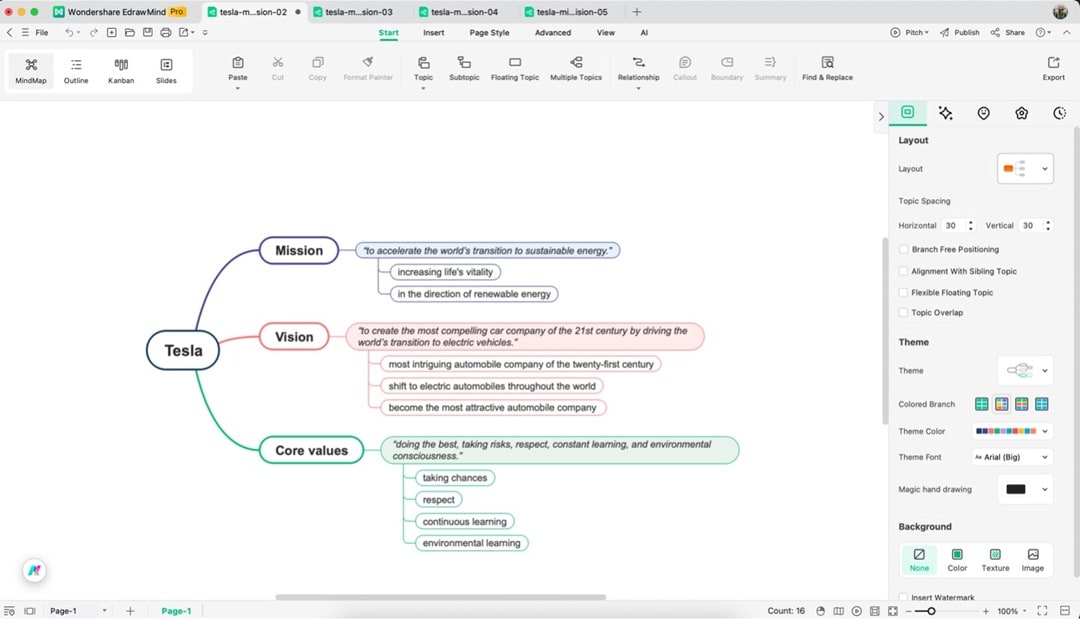
From there, you can expand with supporting ideas. EdrawMind also includes AI diagram generation and formatting tools, making the process simple. Once finished, you can export your mind map to PDF, PowerPoint, or image formats for presentations or reports.
Steps To Make a Tesla Mission Vision Statement Analysis Mind Map
You can try to create our first Tesla mission-vision statement analysis mind map. Load up Wondershare EdrawMind or any other program of your choice. No matter what you pick, this guide will surely help you out.
Step 1
First, you have to edit the main topic. Write in something like “Tesla’s Mission-Vision Statement.”

Step 2
Then, add in the main branches, which should be “Mission,” “Vision,” and “Core Values.” Add in other branches as necessary.
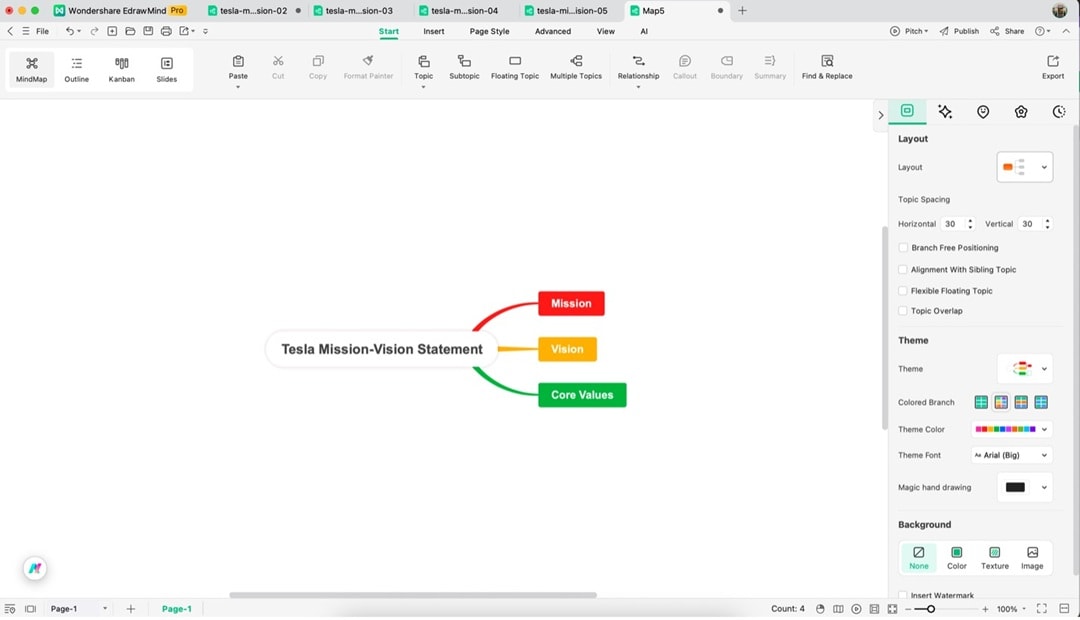
Step 3
After the main branches come the content under them as sub-branches. This pertains to what the mission-vision statement actually is and your analysis of it.
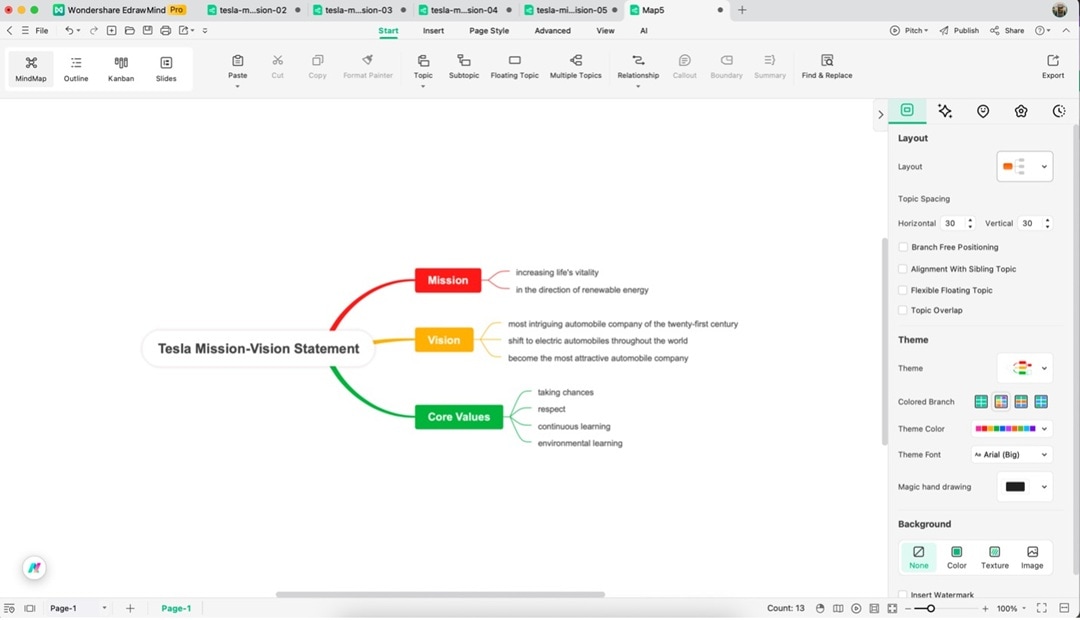
Step 4
Once done with the content, you can design it if you like. Adjust the shapes, lines, colors, text, and other essential elements.
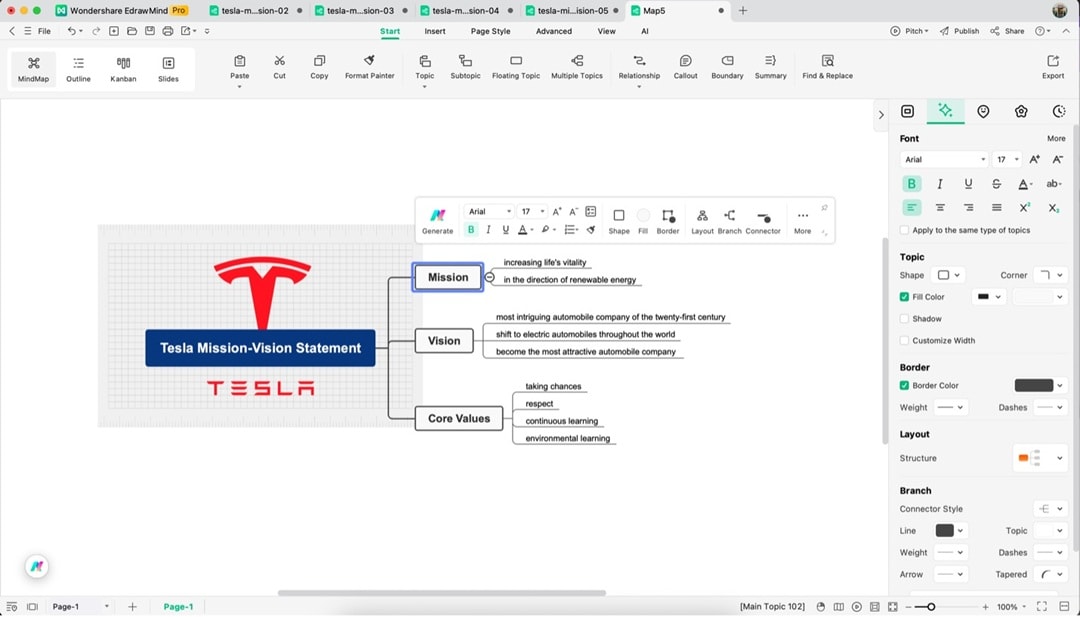
Step 5
After finishing up with the design, proceed to export it as JPG, PDF, or other file formats.
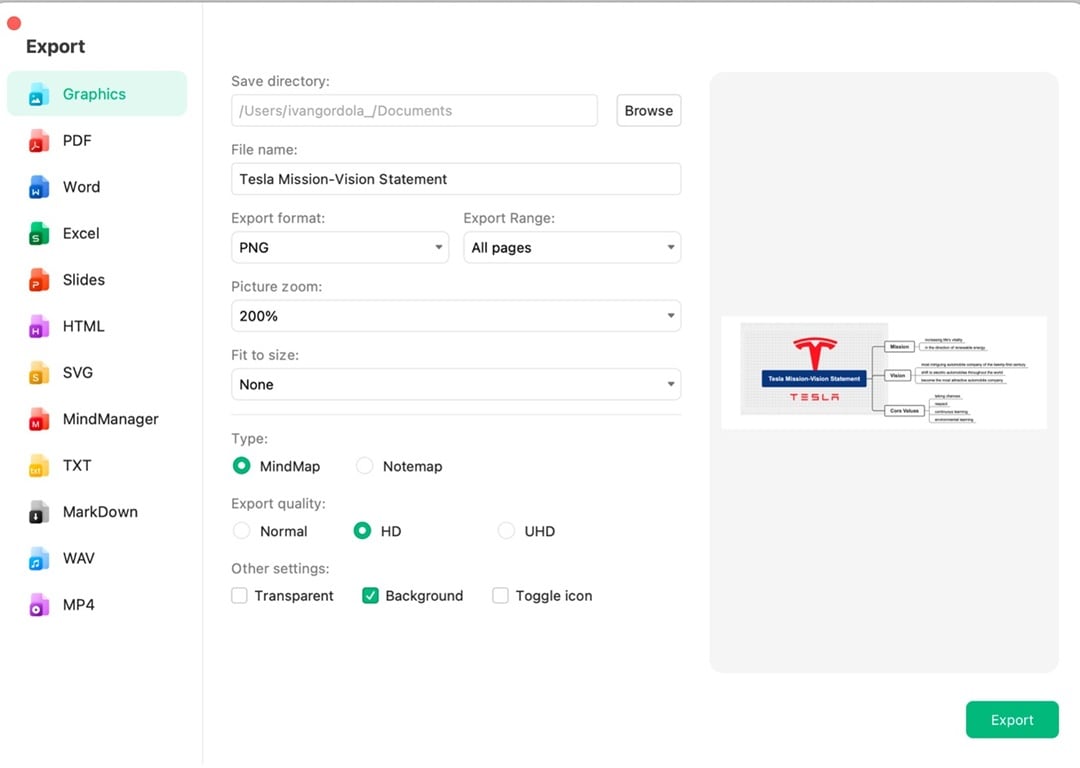
Tips When Making a Tesla Mission Vision Statement Analysis Mind Map
Lastly, here are some tips you can follow to analyze Tesla’s mission-vision statements into a mind map. These are just some extra knowledge that you don’t necessarily have to follow:
- Use short keywords. Keep the text brief. Instead of writing complete sentences, use terms like “sustainable energy” or “innovation in EVs.”
- Separate mission and vision. Make sure each has its own branch. The mission explains Tesla’s role today, while the vision highlights where it aims to be.
- Add real examples. Support each point with concrete items. For instance, solar panels or battery storage should be added under sustainability.
- Emphasize Tesla’s core values. Highlight ideas like innovation, clean energy, and global impact. These are central to the brand’s identity.
- Incorporate branding. Use Tesla’s signature colors — red, white, and black — to make the mind map reflect the company’s image.
- Balance the diagram. Spread content evenly across branches. A balanced map looks cleaner and is easier to understand at a glance.
FAQs
-
1. What happens when "accelerating transition" conflicts with "compelling car company"?
Acceleration sometimes requires vehicles that are boring and practical. Compelling design can sacrifice efficiency or affordability. Tesla usually chooses compelling over purely practical.For example, Model S Plaid prioritizes performance over efficiency. Track Mode reduces range for fun factor. These choices serve "compelling" over "acceleration" of mass adoption. -
2. Why doesn't Tesla's mission mention profitability like other companies?
Tesla positioned itself as mission-driven rather than profit-driven. This attracts employees, customers, and investors who want purpose beyond money. Profitability gets assumed, not stated.For example, Tesla employees accept lower salaries for stock options and mission alignment. This reduces costs while maintaining talent quality compared to traditional automotive companies. -
3. How does Tesla's Full Self-Driving feature serve the sustainable energy mission?
Autonomous vehicles could reduce the total cars needed. Shared autonomous fleets would cut per-mile energy consumption. FSD serves efficiency goals beyond just selling more Teslas.Example: One shared autonomous Tesla could replace 10 private cars. This reduces total vehicle production and energy consumption while advancing the sustainability mission.




